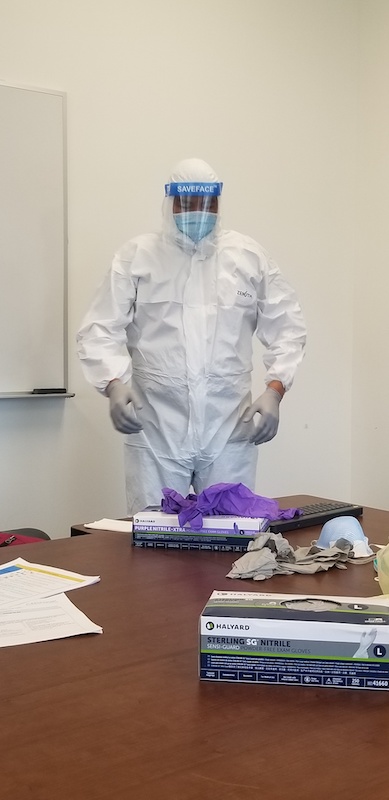As Eeyou Istchee transitions into Phase 3 of its deconfinement plan, life is slowly but steadily returning to normal. While people are enjoying the warm weather and stable pandemic situation, however, local CMC teams remain hard at work to ensure the public’s health and safety.
In Waskaganish, a pandemic plan was rapidly developed, and a committee formed with representatives from public health, the local Community Miyupimaatisiiun Centre (CMC), Eeyou Eenou Police Force, the school board, the Elders’ Council and Youth Council. With travel restrictions limiting the flow of people and goods, the local emergency management task force also helped businesses develop continuity plans.
“I believe we were the first community to come up with this inter-community travel protocol,” said the Waskaganish task force coordinator, Ryan Erless. “In Phase 1, people were getting anxious to see family members from other communities. We had public-safety officers review the request forms. If they met the criteria, they could pass the checkpoints.”
During the initial outbreak, public-safety employees occupying these checkpoints worked 73 days straight to limit the risk of community exposure. While this relentless workload has abated, it demonstrates the dedication with which healthcare workers have handled the crisis.
Clinics have set aside “red zones” to confine those with Covid symptoms and are still asking patients to call ahead before showing up, even for medication refills. Besides ensuring visitors answer pre-triage questions and wear a mask, healthcare workers are prioritized for testing.

“We compiled a list of all the high-risk people working on the frontlines and sent it to public health,” Erless told the Nation. “They determine who should be tested. I believe they do 20 tests per cycle in the Cree Nation. At first, testing would take us maybe a week and now it’s just a few days – that service is remarkable.”
As healthcare services slowly return to normal, more patients and escorts are travelling south for appointments that had been postponed. However, the Cree Health Board has a serious problem with no-shows on charter flights, which are limited to 10 passengers due to distancing requirements. To increase patient capacity, they have started using buses for transportation.
On the first weekend of July, there were 14 no-shows, taking away valuable seats from people trying to return home or travel to an urgent appointment. The CHB has begun calling people to confirm their flights and ask that anyone choosing not to use their seat inform their CMC in advance.
“I’m pretty sure a lot of people want to go but don’t want to isolate coming back,” said Laurie Ann Georgekish Hester, one of Wemindji’s Covid communications leads. “Especially the patients who have to go for an appointment, they cancel because they don’t want to isolate after.”
Georgekish Hester recently went on community radio to clarify the mandatory self-isolation law. She said some people didn’t realize that those isolating are still allowed to go outside. Her department has been checking in with patients in isolation by telephone so they don’t feel alone.
“I messaged one person who can’t see her kids or grandkids,” Georgekish Hester told the Nation. “She sees them through the window. Most are just anxious that their isolation will be done. It’s challenging for people in the mine who have to isolate when they come back – I know some go to Montreal or Val-d’Or for their holidays.”
While people have generally adapted, there are growing frustrations with restricted liberty. In Waskaganish, police issued 231 tickets at house parties between April 5 to June 6. With household gatherings banned, more youth in all communities can be seen drinking outdoors.
There are many more people involved in healthy outdoor activities, such as a walking challenge organized by public health. Participants received free shirts that state “walking alone” and posted weekly selfies of themselves walking with the hashtag “StaySafe”.
Walking-out ceremonies and other outdoor gatherings have resumed with precautionary measures and limited numbers. A clergy group in Waskaganish recently organized an outdoor gospel jamboree on the church lawn. Public safety has helped navigate some of the challenges that these distanced events can pose.
“We just had a funeral for one of our Elders who passed away,” said Erless. “We had to do the funeral service outside by the graveyard. It went well, but it was kind of hot. We created a temporary shelter, had a microphone with speakers, conducted a small service then they did the committal after that. We provided masks, gloves and water. The public could go but had to stand at a distance.”
With many businesses slow to open, Erless’ team is helping manage the distancing requirements. A temporary drive-thru was established to help the popular frozen meat company, Distribution Dany Gauthier, deliver orders in the community. Online sales have also been booming, with longer lines at the post office than at the height of the Christmas season.
Private food sales on social media that have been discontinued since March are set to reopen shortly. Erless has been coordinating training for a food safety handling course in a post-pandemic context.
“A lot of people are asking if they can do private takeout and food sales,” explained Erless. “Local restaurants are overwhelmed sometimes with the number of orders they have to process. If you order a cheeseburger, you have to wait two hours.”
Erless recognizes the sacrifices people have made these past months. “I want to personally thank everyone who respected the protocols,” he said. “They’re role models – children see what they do and then do what they do.”





